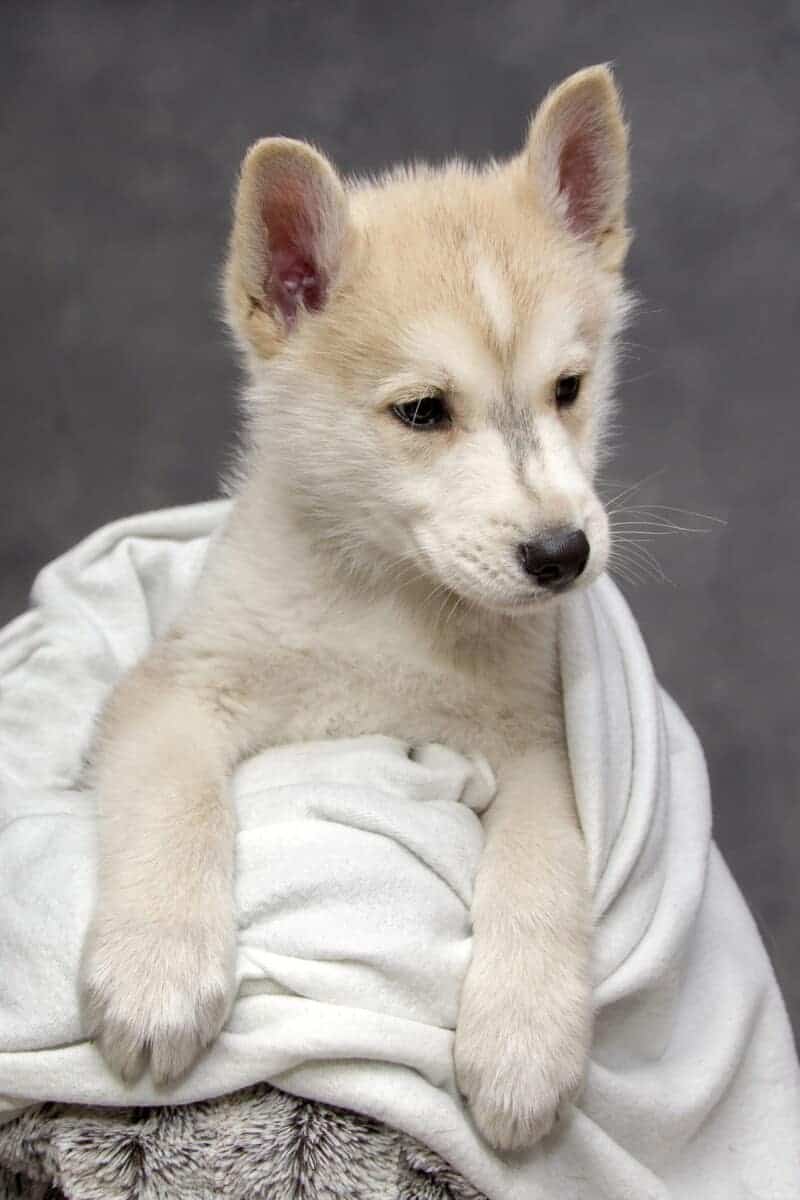Raising a puppy is hard work, especially if they start misbehaving at nighttime. If your puppy is causing a disturbance when you’re trying to sleep, you might regret adopting a puppy in the first place. Never fear; in this article, we will identify common issues with puppy care that cause your puppy to go crazy at night and solutions so you and your puppy can both be happy.
The most likely cause of your dog going crazy at night is the release of excess energy or frustration. There are many reasons why your puppy could be unruly at night, including late feedings, lack of exercise, or being a breed that misbehaves more often than others. Most of these puppy problems are easily solvable.
Read on for why your puppy might be misbehaving at night and how to solve each one. That way, your puppy can receive better care, and you can live happily with your furry companion. You can also find out how to train your puppy to settle and relax so you can use these commands to teach your puppy proper behavior.
Contents
- 1 Reasons Why Your Puppy Might Be Misbehaving at Night
- 1.1 Feeding Your Puppy A Poor Diet
- 1.2 Feeding Your Puppy Before Bedtime
- 1.3 Your Puppy Has A Lack of Exercise
- 1.4 Your Puppy Has Separation Anxiety
- 1.5 Your Puppy Is Scared
- 1.6 Your Puppy Has A Poor Sleeping Environment
- 1.7 Your Puppy’s Breed Typically Shows Misbehavior
- 1.8 Your Puppy Is In The Age Range for Misbehavior
- 1.9 You Have Unintentionally Encouraged Your Puppy’s Misbehavior
- 2 Training Your Puppy to Relax at Night
- 3 Conclusion
Reasons Why Your Puppy Might Be Misbehaving at Night
If a puppy isn’t receiving optimal care from its owner, it might act out in an attempt to communicate that things need to be changed. Misbehaviors can also be shown at certain ages in particular juvenile dogs; they are transitioning into becoming adult dogs in this stage of their life. Here are some reasons why your puppy might go crazy at night, and solutions:
Feeding Your Puppy A Poor Diet
Some dog food formulas are made with preservatives and corn syrups, which provide no health benefits for your puppy and can cause obesity. These sorts of ingredients can build up excess energy in your puppy and make them hyper. Just like you would give your child dinner containing high amounts of sugar, as you know it will make them hyper.
Solution: The best kinds of foods for your dog to maintain a healthy diet are those packed with nutrients from meat, grains, fruits, and vegetables. Check out this article from the American Kennel Club, highlighting some of the best foods for your dog to eat and how to choose them.
Feeding Your Puppy Before Bedtime
A puppy’s stomach and bladder are much smaller than an adult dog’s, so if you feed them or give them water before bedtime, they will whine until they are let out to do their business. Feeding your puppy before bedtime can cause indigestion, accidents, and naughty behavior as they are trying to let you know they need to use the bathroom.
As highlighted above high energy foods late at night will give your pup some excess energy that they will want to burn off, this is when puppies tend to go crazy. Although dinner is something that’s easier to manage, try not to give your pup treats during the evening or into the night.
Solution: Avoid feeding or giving your puppy a drink three hours before bedtime. Here are some ideas from the West Greenwich Animal Hospital, on helping your puppy to sleep.
Your Puppy Has A Lack of Exercise
When your puppy doesn’t get enough exercise, they will build up energy that they release in ways you might disagree with. What you see as misbehaving, such as going through random bursts of hyperactivity and shredding up furniture or clothing, is really a puppy’s way of telling you they need more exercise in their care routine. Check out our article on “How Much Exercise Does A Dog Need Everyday” for some great advice on building a routine for your dog.
Solution: Research exercise needs for your puppy’s specific breed and try to integrate the proper routine into their daily schedule.

Your Puppy Has Separation Anxiety
If all a puppy sees as they’re growing up is you then they might get attached to you in the belief that you are their parent. It’s hard for a puppy to be separated from someone they are so connected to, especially for long hours like working a regular nine-to-five job or going to sleep at night. Puppies with separation anxiety might keep you up with their howling and whining.
Its also important to note that separation from your puppy in the early days is vital, as they will carry any anxiety with them into adulthood.
Solution: Keeping a safe secure space for your puppy is the best way to transition them into being without you. Try giving them lots of toys and distractions whilst you are gone. I’m afraid that you will have to ignore any whining as painful as it may be.
Your Puppy Is Scared
Being confined in an uncomfortable crate can scare your puppy, as can loud noises like thunderstorms or celebratory fireworks on holidays. When your puppy is frightened, they will howl and whine in distress, and sometimes even lash out by biting you or tearing furniture or clothing apart.
The dark can also be an uncomfortable place for your puppy, but something they will get used to eventually. Check out our article called “Are Dogs Afraid Of The Dark” for more info on how your dog perceives the darkness and what you can do to make them more comfortable.
Solution: Crate-train your puppy so they won’t fear being in one. Give your puppy some calming treats during thunderstorms and the holidays, and gently pet the side of their face or their ears so they can relax.
Your Puppy Has A Poor Sleeping Environment
Empty crates are flat and hard, which isn’t a very comfortable sleeping environment for your puppy. If your puppy’s crate is outside, they are subject to rain, drafts, and cold and hot weather. Your puppy won’t be able to sleep if they are uncomfortable or in unstable weather, so they will howl to be let inside.
Many owners raise their dogs to sleep outside, but it’s important to know that although dogs are tough they are still domesticated. Keeping your dog warm and comfortable is paramount regardless of whether they are outside or inside. Puppies will take any fears or discomforts with them into adulthood and your dog may develop other fears or destructive behaviors.
Solution: Keep your puppy’s crate inside and make sure they have a cozy bed and some soft blankets to sleep on. This will ensure they get a good night’s rest without misbehavior.
Your Puppy’s Breed Typically Shows Misbehavior
Certain dog breeds tend to have fixed personalities. For example, huskies are known for being dramatic, and golden retrievers are known for being sweet. If your puppy has always been up to no good during the nighttime, perhaps their breed is notorious for being naughty.
Of course just because your breed has some mischievous traits to them, doesn’t mean they don’t have other traits like trainability, loyalty, and playfulness.
Solution: The best thing you can do when your dog is naughty at night is to train them in commands so they will learn right from wrong.
Your Puppy Is In The Age Range for Misbehavior
Adolescent dogs transitioning into adult dogs are more likely to misbehave as their hormones and attitudes change. Puberty for puppies typically begins at around six months and can continue to 18 months and up to 2.5 years. Small breeds and females tend to reach social maturity faster than large breeds and males.
Solution: The best thing you can do when your puppy is going through this period is to understand that they aren’t going to be interested in the same things as when they were younger. Don’t give up on your puppy; continue training them and increase their playtime.
You Have Unintentionally Encouraged Your Puppy’s Misbehavior
Even without the intention of encouraging your puppy’s misbehaviors, you could be giving in to their demands by giving them treats, toys and coming to their beck and call. Doing this will cause your puppy to believe they can get whatever they want whenever they want it, which is not the case. Naughty acts from being spoiled are different from naughty behaviors from poor care.
Solution: Discipline your puppy when they misbehave instead of giving in to them. Be firm and consistent without shouting or being aggressive. Use timeouts, but never threaten or get physical with them.
Training Your Puppy to Relax at Night
The most helpful training commands to teach your puppy when they are naughty is ‘go settle’ and ‘relax.’ These commands are good for when your puppy is being too hyper or has done something naughty, like chewed furniture or clothing, so they can go to a place where they can calm down.
Go Settle
Because puppies aren’t old enough to know better, they cannot control their behaviors as easily as a fully matured dog. ‘Go settle’ can help your puppy by teaching them to go to a place where they can settle down when they get too riled up.
- Bring your puppy to the area you want them to go to when you use the command.
- Use the cue ‘go settle’ and lure your puppy on their dog bed with a dog treat or dog toy.
- Once your puppy is fully on their dog bed, praise them and give them the treat or toy.
- Repeat until your puppy is completing the command 100% of the time.
- Now work on getting your puppy to stay, sit, and lay on their bed after completing the command.

Relax
When your puppy is overjoyed, you can use the ‘relax’ command to help them find an inner calm to prevent bad behavior. You can also use this command to bring them peace when they are scared, like during thunderstorms.
- While your puppy is already in a relaxed state, use the cue ‘relax’ in a soothing voice.
- Repeat the first step throughout the day.
- Start using the cue when your puppy isn’t already in a relaxed state.
- Repeat until your puppy completes the command 100% of the time.
- Slowly work on using the cue in busier environments.
Conclusion
Most of the time, puppies aren’t purposefully misbehaving but trying to tell you something regarding their care. Other times, puppies are inadvertently showing naughty behaviors because they are going through a phase similar to human teenagers. Getting a puppy is an exciting achievement that results in a lifetime friendship when you put work into caring for them.

